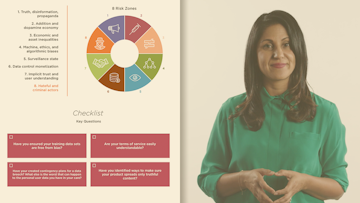

Ethical Tactics

You may have a basic understanding of technology ethics, but let's go deeper and understand how to apply them. In this course, Ethical Tactics, you'll learn to build your muscle of foresight, and understand how to apply ethics to your products and culture....
Read more
Good to know
Save this course
Career center
Project Manager
Data Scientist
Business Analyst
Software Engineer
Product Manager
Consultant
Data Engineer
Policy Analyst
Technical Writer
UX Researcher
Researcher
Product Designer
Innovation Consultant
Salesforce Developer
Technologist
Reading list
Share
Similar courses
OpenCourser helps millions of learners each year. People visit us to learn workspace skills, ace their exams, and nurture their curiosity.
Our extensive catalog contains over 50,000 courses and twice as many books. Browse by search, by topic, or even by career interests. We'll match you to the right resources quickly.
Find this site helpful? Tell a friend about us.
We're supported by our community of learners. When you purchase or subscribe to courses and programs or purchase books, we may earn a commission from our partners.
Your purchases help us maintain our catalog and keep our servers humming without ads.
Thank you for supporting OpenCourser.

